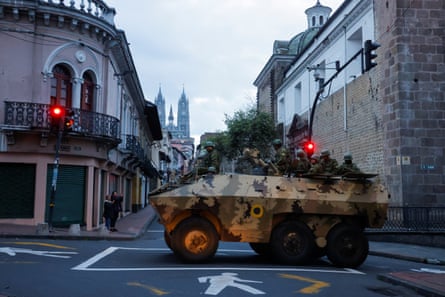The citizens of Ecuador were not expecting the rapid and drastic decline in their country’s security. The rate of murder and violence related to drug trade has greatly increased, making Ecuador one of the most perilous nations in Latin America.
A few years ago, Ecuador was a peaceful area situated between the two largest cocaine producers in the world, Colombia and Peru. These countries have experienced their own conflicts between security forces and leftist rebels associated with the profitable drug trade.
Ecuador’s president, Daniel Noboa, has announced a state of “internal armed conflict” in response to the increase in violence within the country. He has identified 20 drug trafficking organizations as terrorist groups and given the military the authority to take action against them, while adhering to international humanitarian laws.
The announcement was made while Ecuador was experiencing turmoil and violence due to the escape of Adolfo Macías, also known as Fito, on Sunday. President Noboa responded by declaring a state of emergency, which led to a series of attacks by criminals both in and out of prisons. These attacks have resulted in the deaths of police officers and prison guards, as well as the invasion of a TV station by armed gang members during a live broadcast.
Ecuadorians are filled with fear. In the past, Ecuador was more famous for its volcanoes, diverse wildlife, and as a popular destination for elderly Americans looking to live comfortably on their retirement income due to the pleasant weather and affordable cost of living.
Fernando Carrión, a security expert from Quito’s Latin American Social Sciences Institute, remarked that this is unprecedented. He also noted that they have always viewed themselves as a peaceful island, but they were aware of the potential for this to happen.
According to Carrión, the rate of violent deaths in 2017 in the South American nation was five per 100,000 people. However, it has now risen to 46 per 100,000 people, making it the most violent year in Ecuador’s history. Police records show that there were at least 7,592 violent deaths in 2023, compared to 4,426 in the previous year.
The most recent outbreak of aggression is connected to the breakout of not only Macías, but also another leader of a gang, Fabricio Colón, who escaped from prison during the disturbances on Monday evening. The prosecutor’s office has linked Colón, who heads the Los Lobos gang, to the murder of presidential candidate Fernando Villavicencio last year, as well as making death threats against attorney general Diana Salazar.
Never before have organised crime’s tentacles reached so far into the corridors of power, said Carrión, and now several gangs are rebelling against the new president’s tough approach as he attempts to shake up their control of the prisons, pledging to militarise jails, lengthen sentences and isolate powerful kingpins like those who just escaped.

Noboa promised to emulate El Salvador’s president, Nayib Bukele, by building two maximum security prisons with the same company and design used by the popular leader.
Due to economic struggles, extortion schemes, and the fear of experiencing violent acts, numerous citizens of Ecuador have opted to leave their country. Despite the dangers of crossing through the treacherous Darién Gap between Colombia and Panama, tens of thousands have taken the risk and migrated northward. As reported by Panama’s migration agency, Ecuadorians now make up the second largest group, following Venezuelans, to undertake this journey.
Renato Rivera from the Ecuadorian Observatory on Organised Crime stated that Ecuador’s economy, which is connected to markets in Asia and Europe, has also become a major hub for cocaine trafficking due to the lack of security measures in its ports. General Pablo Ramírez, the former director of police anti-narcotics, revealed that Ecuador exports approximately 1 million containers annually, with 75% of them being bananas. This trade serves as an ideal disguise for drug smuggling operations.
A significant portion of the increase in violence in Ecuador is attributed to the rivalry between various local criminal groups. These groups have adopted brutal and intimidating methods of violence from the Mexican drug cartels, specifically the Sinaloa and Jalisco New Generation cartels.
The gangs have formed partnerships with Balkan traffickers, who dominate the profitable European market that has surpassed the United States as the primary market for cocaine. These opposing groups have adopted urban guerrilla tactics from former Colombian guerrilla organizations, which, according to security experts, have expanded their involvement in drug and criminal enterprises to nearby nations following the 2016 peace agreement in Colombia.
Currently, the violent strategies are being used against a mutual opponent – the government of Ecuador.
Source: theguardian.com

















